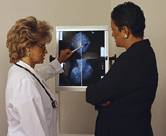
THURSDAY, Nov. 15 (HealthDay News) — The risks of developing heart problems while taking the breast cancer drug Herceptin alone or with other anti-cancer drugs may be even higher for older women than thought, new research indicates.
Herceptin (trastuzumab) has long been used to treat breast cancers that overproduce HER-2, also known as human epidermal growth factor. The drug improves disease-free and overall survival, but experts have known that it increases the risk of heart failure because it can affect the ability of the heart to pump blood. It can also raise the chances of developing cardiomyopathy, where the heart muscle becomes enlarged or rigid.
Now, a new study that focused on women aged 67 and older has found that the risk may be higher than believed. The report is published online Nov. 14 in the Journal of the American College of Cardiology.
For older women, the message is this, said study leader Dr. Jersey Chen, an assistant professor of cardiology at the Yale University School of Medicine: “You should know that your risk of developing heart failure or cardiomyopathy may be higher than what is quoted to you [by your doctor].”
Those earlier estimates, Chen said, are based on clinical trials that mainly looked at younger and, in some cases, healthier women.
In those studies, the risk of heart failure, for instance, increased by about 1.6 percent for women on Herceptin. In Chen’s new research, the team found that Herceptin or Herceptin given with the anti-cancer drugs known as anthracyclines, raise the risk of either heart failure or cardiomyopathy by about 9 percent in the first year compared to no chemotherapy.
Chen looked at more than 45,000 women, aged 67 and older, who had early-stage breast cancer and were treated with a variety of regimens from 2000 to 2007.
The researchers followed them for three years to see who developed heart problems.
The rates of either heart failure or cardiomyopathy were higher for those getting Herceptin and anthracyclines, either separately or together, than those who did not receive chemotherapy.
Put in other terms, for every 100 patients, 32 of those on Herceptin and 42 of those on Herceptin and anthracycline had developed cardiac problems by the three-year mark, compared to 19 of every 100 patients who did not get adjuvant therapy.
Women who are on these therapies, Chen said, may need to seek additional monitoring. They should discuss the risks and benefits of the treatment with their doctors.
Women should also put these risks in perspective, said Dr. Xianglin Du, a professor of epidemiology at the University of Texas Health Science Center at Houston who has also studied cardiac problems linked with the drugs.
“Overall, their findings were consistent with what were found in our study published a year ago,” she said. “Because many studies demonstrated that the addition of trastuzumab to chemotherapy significantly prolongs survival, women with breast cancer are advised to talk to their oncologists to weigh the benefits against potential risks for a better informed decision.”
She agreed that closer monitoring may be needed.
The study was funded by the American Heart Association and a collaborative agreement by Memorial Sloan-Kettering Cancer Center. One co-author is a consultant to Celegene, GlaxoSmithKline, Abraxis Bioscience, GTX, Amgen and Genentech.
More information
To learn more about Herceptin, visit the U.S. National Library of Medicine.

